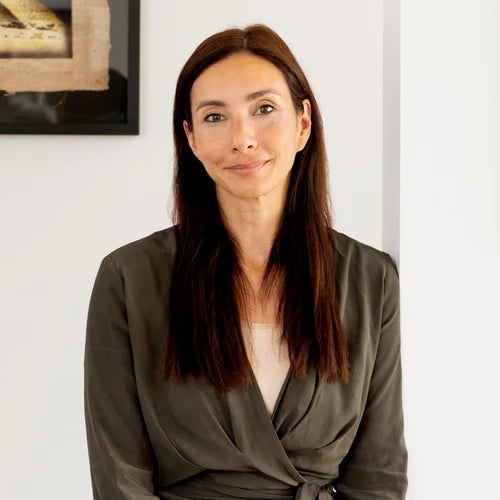SOBRIETY IS A SUPERPOWER
It’s not an exaggeration to say that Dr Michelle Dickinson is a National Treasure. She has a PhD in biomedical materials engineering but is most famous for her alter-ego, Nanogirl. The super-hero character is all about making science engaging for children – especially girls. She's written two best-selling books, was named the NZ High-Tech Awards Inspiring Individual for 2020, is a member of the New Zealand Order of Merit and won a Women of Influence award for Science and Innovation. She’s won the Sir Peter Blake Leadership Award, served with Richard Branson, explained COVID-19 to kids with Jacinda Arden and designed dresses for Icebreaker. And if you think that means she’s pretty busy, just wait until you hear about the year she just had.
The 2020 business-model flip
The success of Nanogirl in New Zealand meant that Michelle had her sights set internationally. The science-based pantomime had been recognised globally, and they’d thrown everything they had – around $2.5 million – behind a global tour. Enter COVID-19. Flights were grounded and so was Nanogirl Productions. But for Michelle, quitting wasn’t an option – it’d mean everybody involved would lose everything. So instead, they went back to the drawing board.
“We looked at what we offer and what the world needed. We saw schools were closing down all over the world and that teachers weren't ready or prepared,”explains Michelle.
Science was especially tricky to teach remotely, and teachers around the world were saying they’d just have to drop it for the duration. So Michelle came up with a plan.
“It was bonkers. We moved into our office and my husband and I learned how to edit, and made an episode a day, every day for 50 days."
Teaching Kiwi kids through the pandemic
While they were underway, the Ministry of Education got in touch about creating a 12-episode science education programme for high school students.
“We said ‘yes’ to everything,” says Michelle.
Michelle also designed science worksheets built into Eat My Lunch food packaging, leveraging those already established networks to reach kids without access to technology.
“It was pretty rewarding and terribly different from what we planned. But life's an adventure! I got quality time with my husband shacked up in an office, sleeping on the floor, living off microwave food for a month. My husband and I are closer because of it. We have this life experience that is unique to us and it's been amazing. So I feel very positive.”
And she has reason to be. The success of the online shows has quickly been followed by Nanogirl live events, now going “gangbusters” in New Zealand.
“Last week we did 19 Nanogirl Parties around the country,” says Michelle.
Celebrate failure to build resilience
This remarkable achievement speaks to Michelle’s deeply embedded resilience which she credits to science, which celebrates failure.
“A scientist tries to get things wrong every single day. You'll come up with a hypothesis and try every day to prove it wrong,” says Michelle.
But in school, the emphasis is reversed.
“If you get something wrong in school, no one says, ‘What did you make instead?’ So at school, the work becomes about making things perfect every time to get the grade.”
Michelle recommends not just being fine with failure, but celebrating it.
“We find that by the age of 12 or 13, girls particularly are very afraid of failure. And then once they're so afraid, they won't try things that they might fail at. But success is a terrible teacher. If you get things right every time you don't learn anything. So have a big party when your kid fails.”
Giving up alcohol as a social crutch
Ironically (and uncomfortably), Michelle, who spends her life interacting with people, is an extreme introvert.
“If I had my dream life, I would never go out. I would just sit at home in my slippers and read books and hang out with my dog and my husband.”
Instead, her public profile means she’s always at events promoting the work she’s so passionate about. For a long time, Michelle relied on booze to get her over the awkwardness.
“I was never a big drinker until I started going to all these events where you get wine when you walk in. Then there's wine all night and very few other options,” she explains.
Michelle realised she was drinking 20 to 30 units a week without even thinking about it – and not counting the few glasses she’d have with her husband. That went on until she spent two weeks off the grid, climbing Machu Pichu. While others in the climbing group were hankering for a beer, she realised she didn’t miss it at all.
“I actually felt so great, so I decided to give it up and I did. That was like four years ago and I haven't missed it."
The ups and downs of being sober AF
The positives were immediate. Instead of spending Saturday morning sleeping off a hangover, she’d jump out of bed with energy. That kicked off a virtuous cycle where she had more motivation to exercise, naturally made better food choices and slept much better. But the social side of giving up alcohol wasn’t so easy, and she’s worked on other strategies to help her relax at events.
“Events don't cater for people who don't drink. You get horrible orange juice or tap water next to this amazing selection of wine and alcohol.
“I also don’t have that Dutch courage, so that was difficult. But I have this amazing husband who is an extrovert. He’ll go and do all the scanning, then introduce me to someone he's pretty sure I will get on with,” she laughs. “I now have a human buffer!”


Share:
When Gin Meets Tonic
Sober & Surprising AF